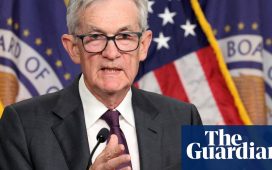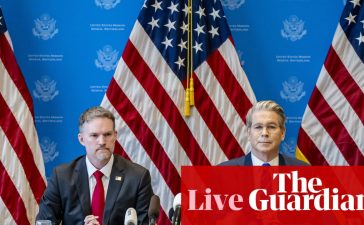Unlock the Editor’s Digest for free
Roula Khalaf, Editor of the FT, selects her favourite stories in this weekly newsletter.
Mounting protectionism threatens to unwind 30 years of progress in closing income gaps between poor and rich countries, the World Trade Organization has warned.
The WTO said in a report published on Monday that income per capita in low- and middle-income countries had almost tripled between the creation of the body in 1995 and 2023. Global income per capita had increased by a lower percentage of about 65 per cent over the same period.
WTO director-general Ngozi Okonjo-Iweala said the findings countered “the currently fashionable notion that trade, and institutions like the WTO, have not been good for poverty or for poor countries”.
However, Okonjo-Iweala acknowledged that globalisation had led to many people in rich countries feeling “left behind” and “unable to benefit from new opportunities”.
“Their frustration [has] fuelled a political backlash against international trade,” said Okonjo-Iweala on Monday.
Some believe the backlash against trade has weakened the role of international standard-setters, such as the WTO.
“Other priorities for governments are more important than [trade] predictability,” said Dmitry Grozoubinski, executive director of the Geneva Trade Platform think-tank. “Increasingly, on things that governments really care about, they are beginning to obviate or straight up ignore WTO rules.”

Lawmakers in advanced economies — including the world’s largest, the US — increasingly view protectionism as a means to show that they recognise the impact that globalisation has had on manufacturing jobs closer to home.
Former US president and Republican nominee Donald Trump has promised 10 per cent tariffs on all imports, should he win a second term in November. Imports from what was once the US’s biggest trading partner, China, are set to face a levy of 60 per cent.
His successor Joe Biden has maintained many of Trump’s policies. Current US Treasury secretary Janet Yellen has said that the US has lost 2mn manufacturing jobs since China joined the WTO in 2001.
While the WTO said most workers had benefited from trade, it acknowledged there were exceptions. Those living in rural areas or without relevant skills had become more vulnerable to trade-related job losses.

States in the US rustbelt such as Michigan, which industrialised early, have suffered a dramatic loss of export trade since the 1970s, while southern states have thrived. Carmakers and others have invested there because land and workers are cheaper.
The WTO director-general argued that protectionism was not an effective policy to correct inequalities, noting that trade restrictions can hurt economies as they tend to raise production costs, while “inviting costly retaliation from disgruntled trading partners”.
Research from the Peterson Institute estimates that Trump’s proposed tariffs will cost the average US household $1,700 a year, with poorer households facing an even higher burden.
The UK’s exit from the EU single market brought about a 6 per cent jump in food prices. The increase in the cost of living for the poorest households was 52 per cent higher than for the richest households, according to a study cited by the WTO.
“We need open trade, [ . . . ] but we also need complementary policies,” said Ralph Ossa, chief economist at the WTO. “If you want to help workers, you need to make sure that you have the domestic policies in place that help them move towards opportunity.”







